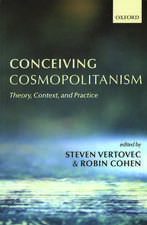Social Unrest and American Military Bases in Turkey and Germany since 1945
Autor Amy Austin Holmesen Limba Engleză Paperback – 9 noi 2016
| Toate formatele și edițiile | Preț | Express |
|---|---|---|
| Paperback (1) | 284.39 lei 6-8 săpt. | |
| Cambridge University Press – 9 noi 2016 | 284.39 lei 6-8 săpt. | |
| Hardback (1) | 694.71 lei 6-8 săpt. | |
| Cambridge University Press – 28 mai 2014 | 694.71 lei 6-8 săpt. |
Preț: 284.39 lei
Nou
Puncte Express: 427
Preț estimativ în valută:
54.44€ • 59.15$ • 45.76£
54.44€ • 59.15$ • 45.76£
Carte tipărită la comandă
Livrare economică 21 aprilie-05 mai
Preluare comenzi: 021 569.72.76
Specificații
ISBN-13: 9781316643501
ISBN-10: 1316643506
Pagini: 250
Ilustrații: 5 b/w illus. 4 maps 6 tables
Dimensiuni: 153 x 230 x 15 mm
Greutate: 0.37 kg
Editura: Cambridge University Press
Colecția Cambridge University Press
Locul publicării:New York, United States
ISBN-10: 1316643506
Pagini: 250
Ilustrații: 5 b/w illus. 4 maps 6 tables
Dimensiuni: 153 x 230 x 15 mm
Greutate: 0.37 kg
Editura: Cambridge University Press
Colecția Cambridge University Press
Locul publicării:New York, United States
Cuprins
1. Introduction: the global American military presence in comparative perspective; 2. Social unrest and the American military presence in Turkey during the Cold War; 3. Social unrest and the American military presence in Germany during the Cold War; 4. From shield to sword: the end of the Cold War to the invasion of Iraq; 5. Conclusion: losing ground.
Recenzii
'This important excursion into America's Cold War 'empire of bases' is concisely written, thoroughly documented, and rich with insight. Amy Holmes has written a first-rate book.' Andrew J. Bacevich, Boston University, Massachusetts
'Amy Austin Holmes has written a timely and important book. In it, she addresses a pressing issue in international relations - the rise of America's 'empire of bases' in the postwar era. Holmes offers a compelling account of the anti-base social movements, their roots, and their impact on the American presence, showing the importance of social mobilization for restricting the US ambition to house its bases in Europe as well as illustrating how the anti-base movement became a great deal more effective once it harnessed the power of the labor movement. This study will be judged a signal contribution not just to the study of American military history, but also to the study of social movements.' Vivek Chibber, New York University
'This book addresses the politics of American military bases within a comparative analysis of Germany and Turkey. Through this, Amy Austin Holmes convincingly argues about the relevance of these cases in order to understand the development of the United States as a global power, pointing at the number of American bases outside the continental United States, as well as their peculiar forms. This book is well researched, utilizing archival materials on the US appreciation of and reaction to the peace movements in a very interesting manner.' Donatella Della Porta, European University Institute
'This is a well-written book on an understudied subject, especially in Turkey. Its rich archival data is complemented by an impressive number of interviews conducted in Turkey, Germany, and United States.' Ömer Aslan, Insight Turkey
'In arguably one of the best scholarly treatments on the subject since Alexander Cooley's Base Politics, Holmes broadens her notion of anti-base opposition beyond protests to include different forms of contentious politics. This includes non-violent civil disobedience, labor disputes, parliamentary opposition, and acts of violence and terrorism. Holmes also explores the security relationship between the United States and host governments and the difficulty in sustaining political legitimacy over US bases in the long run.” Andrew I. Yeo, Perspectives on Politics
'Amy Austin Holmes has written a timely and important book. In it, she addresses a pressing issue in international relations - the rise of America's 'empire of bases' in the postwar era. Holmes offers a compelling account of the anti-base social movements, their roots, and their impact on the American presence, showing the importance of social mobilization for restricting the US ambition to house its bases in Europe as well as illustrating how the anti-base movement became a great deal more effective once it harnessed the power of the labor movement. This study will be judged a signal contribution not just to the study of American military history, but also to the study of social movements.' Vivek Chibber, New York University
'This book addresses the politics of American military bases within a comparative analysis of Germany and Turkey. Through this, Amy Austin Holmes convincingly argues about the relevance of these cases in order to understand the development of the United States as a global power, pointing at the number of American bases outside the continental United States, as well as their peculiar forms. This book is well researched, utilizing archival materials on the US appreciation of and reaction to the peace movements in a very interesting manner.' Donatella Della Porta, European University Institute
'This is a well-written book on an understudied subject, especially in Turkey. Its rich archival data is complemented by an impressive number of interviews conducted in Turkey, Germany, and United States.' Ömer Aslan, Insight Turkey
'In arguably one of the best scholarly treatments on the subject since Alexander Cooley's Base Politics, Holmes broadens her notion of anti-base opposition beyond protests to include different forms of contentious politics. This includes non-violent civil disobedience, labor disputes, parliamentary opposition, and acts of violence and terrorism. Holmes also explores the security relationship between the United States and host governments and the difficulty in sustaining political legitimacy over US bases in the long run.” Andrew I. Yeo, Perspectives on Politics
Notă biografică
Descriere
This book argues that that the relationship between US military presence in foreign countries and the non-US citizens under its security umbrella is inherently contradictory.
























